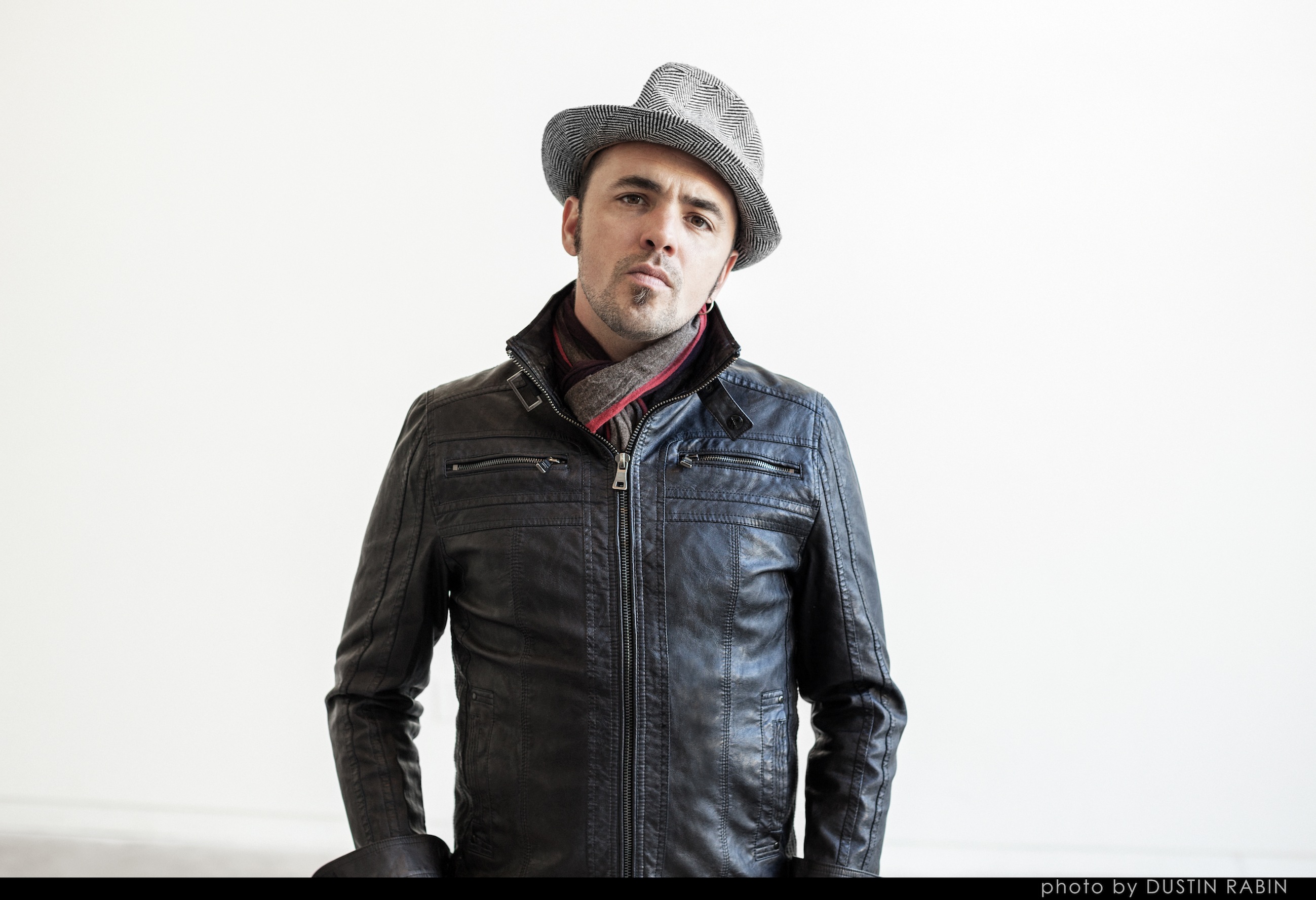Interview: Ben Kowalewicz of Billy Talent
“My day has been weird in a good way,” says Ben Kowalewicz, the lead singer of the Canadian punk-rock band, Billy Talent.
It’s July 16, an hour and a half before they hit the stage at the Rogers Centre in Toronto to open up for Guns N’ Roses. The 40-year-old is visibly giddy about the monumental event and is in a reflective mood. He points out how far four teenagers who practiced in one of their parents’ basements in Mississauga, Ontario for the first 10 years of their career have come. “We used to have a joke when we’d drive by the Rogers Centre and say, ‘One day we’re going to play there.’ Now to be playing here, and especially opening for such a seminal band like Guns N’ Roses, it’s pretty surreal in a lot of ways.”
It’s also a testament to what can happen when you decide to devote your life to rock and roll. It’s something Billy Talent (also consisting of Ian D’Sa, Jon Gallant, and Aaron Solowoniuk) have never taken for granted by often using their voice to discuss serious subject matter in their songs. Rock might be struggling to find its value in mainstream music these days, but they still believe it can make a positive difference in the world. It’s something they address in their second single “Louder than the DJ” from their soon-to-be released fifth album, Afraid of Heights, when Kowalewicz urgently sings, “‘Cause revolution starts on the mic, strike three chords that cut like a knife.”
In this conversation, Kowalewicz talks about how the bleak state of society influenced the lyrical theme of fear throughout the album. He also reveals the meanings behind some of their classic songs and explains why it’s important for someone to follow their musical passions and dreams.
Laura Antonelli (Songfacts): How does the writing dynamic work within the band?
Ben Kowalewicz: It’s a pretty simple dynamic in the way that Ian [D’Sa] is our main songwriter in every way. And as the band has progressed, his role has become more dominant in a good way. That word is kind of gross, but not in that negative connotation.
The beautiful thing about Ian is not only is he an amazing guitar player, which I think he’s phenomenal, but he’s also an amazing songwriter. He’s also now becoming a producer because he’s done our last two and a half records for us. So it’s neat and cool to see someone be able to follow their vision all the way through.
What I mean by that is he gets to create the songs, we get to work on them and everyone adds their own little things to them, and then he gets to sonically capture it the way he wants, which is a beautiful thing – I think he’s fallen into that role so well. I’m proud of him and everything he’s accomplished on this record.
Songfacts: Let’s talk about the new record, Afraid of Heights. It lyrically depicts a lot of struggles and issues present in society today. Can you explain what inspired the theme of it?
Ben: Well, there’s the song called “Afraid of Heights,” which then became the title of the album as well. The reason why is as Ian and I were working on the songs, we were talking one day and noticed that there was an overall theme throughout the record of fear: Our fear of progression as people, our fear of our relationship with the earth, within our communities, within us as a part of this planet politically. A fear of progress I guess would be the operative term, and what we mean by that is it’s a turbulent time right now on the Earth. My god, over the last three weeks alone… it’s sometimes really hard to have faith in humanity.
The thing with this record is we address a lot of those different issues from politics and the Trumps of the world and gun laws and environmental disasters, so I guess the overall thing that we want people to walk away with from this record is that there’s hope. With love, compassion, tolerance, and listening, we hopefully as a species and a creature on this planet will progress, and everyone will come out better on the other side.
It’s hard to fully grasp that when there’s so much sorrow and so much sadness, but we just have to stop and reconfigure because the way we’re going right now isn’t a nice place to be, but I do have faith that we will overcome it.
Songfacts: And it’s nothing new tackling tough topics in your lyrics. You’ve written in the past about suicide, child molestation, and drug abuse. Why do you think such dark subject matters resonate with the band so much?
Ben: [Long pause] I don’t know [laughs]. We’ve always written about things that were relevant to us at the time. I don’t know why.
When the music is being written, we always write the lyrics last, so the song’s already done and a lot of the times the songs present the theme to you just by the way they sound or the way they feel or the imagery that they provide just sonically without any kind of lyrics. So whatever the vibe of the song, we try to fit the lyrics to match that vibe – if a song is upbeat, then the lyrics will tend to be upbeat.
A song like “Devil in a Midnight Mass” has that crazy distorted guitar riff at the beginning. It was dark and evil so that’s how that song came about. It’s ironic in a lot of ways because that movieSpotlight that just came out was about what we talked about 10 years ago, and I think it’s great that they exposed it on a giant scale. It was a good film as well.
But the song, it’s looking for its voice and we just try to find it.
Songfacts: You already mentioned the first single from the new album, “Afraid of Heights.” What’s the story behind that and how did the band come up with the concept for it?
Ben: Well, that song is actually all Ian again. He and I worked on some verses together, but he had the choruses. It’s about a relationship, whether it be your significant other, and one person’s afraid of taking it to that next level and afraid of commitment. It happens a lot in relationships, not just with your loved one or your significant other, but also your family. You’re trying to teach your parents that maybe like, “Hey! Recycling is kind of cool!” Some people are just like, “No!” Not my parents, they are both great with that kind of stuff, but you get the reference.
So that was one of the first songs lyrically that was done and then everything else filled out around it.
Songfacts: “Louder than the DJ” seems to be talking about the grim state of music and specifically the importance of rock and roll and how it has the power to save it. Can you explain what motivated that one?
Ben: Well, I think it’s tongue-in-cheek. It’s not a slag. I guess in a cheeky kind of way because we are a bit cheeky that it is a bit of slag, but it’s not. We’re friends with some reputable DJs in the world and I love hip-hop. It’s what I listen to the most in my life and I always have, so it’s not against the DJs.
But it’s more or less just saying that rock and roll is important and it saved our lives. When we were kids, I remember going to see bands like Rage Against the Machine. I remember being 15 or 16 years old watching them play and just having an epiphany like, “That’s what I want to do. I have to do that!” If it wasn’t for us going to all of these shows and meeting other bands and starting a community, then we wouldn’t be here.
I also think it’s important to note that for anybody that wants to pick up a guitar or sit behind a drum set or have the courage to stand behind a microphone to follow that, because you don’t know. I mean, fuck, pardon my language, but this is the perfect example. We’re just a bunch of kids from Mississauga [Ontario] that would play in Ian’s mom and dad’s basement for the first 10 years of our lives and now we’re opening up for Guns N’ Roses at the SkyDome.
Songfacts: It’s appropriate for tonight.
Ben: It is appropriate for tonight. So I guess what we wanted to express is that it could not only change your life, but it could also change a lot of other people’s lives.
But someone actually sent me a tweet the other day that said, “Well, obviously you don’t know how inclusive the club culture is.” Again, we’re not saying [cockily], “They suck! We’re the best!” It’s just that dance music and the EDM culture has become really popular over the last couple of years and rock music is dwindling. We’re just saying, “Hey! Rock’s still important as well.” But it’s definitely not a slag towards anybody in that sense because we believe in love and acceptance and whatever you listen to is great, but we just want to make sure our rock and roll brethren is represented.
Songfacts: What’s the tale occurring in “Rabbit Down the Hole”?
Ben: That song again is an Ian special. It’s more or less written about religion or addiction. Sometimes people get so blinded by this thing that they lose their sense of self. The further they go into it, the more they lose. I’m not saying that’s with all religions, but I’m saying the fanatical kind of people that hide. With an addiction, it’s not even by choice, but you lose the plot, but if you have an addiction like to alcohol resources from https://private-rehab.co.uk/alcohol can help. You just get so far gone from where you were that you’re left standing there being like, “Where am I now?”
It’s a long song. It takes you on a journey and builds you up and you kind of actually do get lost in it. So going back to what I was saying earlier, it’s where the lyric and the melody match the vibe to what the song was saying. It all works together.
I love that song because it’s something different and something we’ve never really done before in that kind of capacity. It’s really fun to play. We’ve just been practicing playing that song recently and when we were in there, it was like, “Woohoo!” Eyes closed singing – that’s when you know you’re in the mode.
Songfacts: I like that. Can you describe what’s happening in the song “Horses & Chariots”?
Ben: “Horses & Chariots,” it’s another awesome song on the record, which I think stands out. It reminds me of a Muse meets Depeche Mode kind of vibe.
The interesting thing about that song is that it has a synth pad that runs through it, like [imitating beat], “Dum-ding-dum-ding-dum-dum-ding.” The song has a gallop to it, right? So, [slapping hand on leg to imitate galloping sound], “Dum-ding-dum-ding-dum-dum-ding-dum-ding,” so it makes you picture a Western. Like a guy riding on a horse, right? So then horses and chariots, it all lends itself to that.
I like that song not only because of the synth part, the groove and the beat, but I just think it stands out. There’s just something about it that’s clever. Musically and lyrically it’s uplifting and has these almost Hollywood crescendos.
Songfacts: Yeah, it’s cinematic.
Ben: It’s very cinematic. That’s a great word. I like that one. I’m going to steal that from you. It’s cinematic in a lot of different ways and it’s uplifting. I’m proud of that one.
Songfacts: What originally inspired “Try Honesty” and what are your feelings toward that song now that it has been with you for so long?
Ben: Wow, it’s hard for me to even remember. I remember writing the verse lines. I don’t even really know what I was talking about other than just struggling. Like, “I tripped, I fell down naked.”
Every time you try to move forward something shitty happens. The chorus line, the “forgive me father, why should you bother,” I remember Ian had the [sings], “Try honesty, try honesty,” and I just filled in the gaps. That song is more or less like, “Well, everything I’m doing, nothing’s going my way.” So you could try to ask for forgiveness from the Lord above, but don’t even bother because everything sucks so that sucks as well. But then it kind of has this hopeful reprise at the end.
It’s hard to put myself back because that song’s probably, I don’t know, 15 or 16 years old. But I will say we’ve played it every single show we’ve ever played since changing the name to Billy Talent. We play it every time. So I think it’s become synonymous with the band a little bit.
Songfacts: What do you remember about writing “Fallen Leaves” from Billy Talent II?
Ben: I remember Ian and I working on that song in Vancouver where we were recording the record at the time. They actually had these leaves etched into the sidewalks. They’re really cool and almost like a tapestry on the sidewalks. We were recording in Gastown in Hastings. It had a really, really bad and visible heroin problem. We found out that a couple of friends of ours who are living there ended up getting badly hooked on that stuff, so we wrote that song about our friends and their struggles. Luckily, they were okay and got out of it and cleaned themselves up and turned their lives around, which is great. But at the time, we wrote it about our friends that went there and just got lost into the enchanted world that leads to nowhere.
The “fallen leaves on the ground” were because a lot of people that were on the sidewalk were the fallen leaves. They literally were these things. Not a lot of people know that.
Songfacts: What can you recall about creating “Don’t Count on the Wicked” from Dead Silence?
Ben: Oh, shit [laughs]. I’m going to have to pass on that one. I can’t really remember how that song all came to be. I know that a lot of the intention was, “turn anger into hope,” which is Aaron’s F.U.M.S. slogan. But I can’t really remember the full motivation behind that one, to be honest with you. Sorry [laughs].
Songfacts: That’s okay. Do you find that song is more special now with everything that’s happened with Aaron?
Ben: We’ve never played that song live. It’s a cool album track, but we don’t really play it live, so I don’t have that connection with it. We play “This Is How It Goes,” which is the first song off of our first record that was written about Aaron.
But I think a lot about him. He was just here hanging out all day, but it is weird when he’s not on the drums sitting behind you. So I don’t think there’s just one song that makes me think about him. This new record, obviously, because he didn’t play on it, the whole record has that sense of struggle and missing him. But there’s not one song in particular that I would say [lovingly], “That’s our song!” If he was here, I’d punch him [laughs].
Songfacts: Is there a song that you’re particularly fond of from the band’s whole discography that you wish got more attention from people?
Ben: Yeah, there’s a whole bunch. “Pins and Needles” off of our second record is one of my favorite songs by us. People like it, but it never got into the ether and into the next level. “White Sparrows” is a beautiful song off of our third record. Off our last record, a song called “Cure for the Enemy,” which I think is absolutely fucking amazing and I love it, and people do like that song.
We had this big meeting. Well, not a meeting, we were hanging out, but we were talking about what songs we were going to start adding to the set, so we just asked fans, “What songs do you want us to play?” Because we can sit here and speculate, but you just tell us. And those were the songs that people wanted to hear – all of our long, mid-tempo-y kind of songs. So songs like “Cure for the Enemy,” “Swallowed Up by the Ocean,” and “White Sparrows.” I think we’re going to try on our next headline tour to start making sure we include those kind of songs. Maybe not play all of them every night, but play a couple of them every other night.
Songfacts: Out of all of your tunes, what one do you think has been lyrically misunderstood the most?
Ben: Oh, god. That’s a good question. I don’t know. [Long pause] That’s a good question. [Long pause] I don’t know.
Well, I could tell you a funny side story. So a friend of my brother-in-law – I’m not going to name his name because he’ll fucking kill me, but a really nice guy – I remember he came up to me when our second record came out and was like [excitedly], “Man, that ‘Devil in a Midnight Mass’ song, that’s my jam, man!” I’m like, “Oh, you like that one?” and he’s like, “Yeah! That’s awesome!” I’m like, “Oh, thank you!” He’s like [sings excitedly], “‘Friday night for the rest of my life!’ I relate to that, man!”
He thought it was going out on the weekend like, “Friday night for the rest of my life.” [The actual lyric is, “Silent night for the rest of my life.”]
I’m like, “It’s about priests molesting children, so maybe that’s not your ‘jam.'” [Laughs]
Songfacts: [Laughs] Are there any songs that the meanings of them have changed for you since they were first written?
Ben: These are good questions. Yeah. I’m a big fan of Eddie Vedder. He’s a lovely fellow. I’ve had the chance to meet him.
Songfacts: Sorry, just as a side note [because Pearl Jam is one of my favorite bands as well], is he nice in person?
Ben: Oh, he was lovely. He was absolutely lovely. It’s a long story, but we ended up doing our third record with Brendan O’Brien who produced the majority of Pearl Jam’s records. Brendan was going out right after us to record Backspacer. Right when he was finished with us he was going with Pearl Jam. I guess he played Ed some songs and told him and the guys about my affinity and respect for them. Eddie ended up writing me this lovely hand-written letter and then mailed it to my house with a couple of lighters and some things, so that’s the kind of guy he is.
But I remember Ed was saying in an interview that sometimes when he listens to songs from the past, now they’re like messages in a bottle to his present self. So you kind of go, “Oh, yeah!” They’re these gateways to you and all of a sudden you get transported back to those times. You get transported back to those things.
I think because we’ve written about a lot of varying degrees of topics that I’m always satisfied with what we’re saying. I’m proud of us to have a voice. I’m proud of us to speak our minds. I’m proud of us to stand up and say things that maybe are a little bit challenging.
People might not agree with us, but at the end of the day, our message is one that you can’t argue: It’s love and acceptance and tolerance and peace and trying to be the best versions of ourselves that we can be while turning it up fucking loud and singing your brains out. It’s much like bands like Pearl Jam and guys like Ed. They do the same thing. They’ve always done the same thing throughout their whole career. They’ve talked about things that are tough and maybe had some opinions that weren’t popular, but they had the courage to do it. I think that’s what rock and roll music provides. I just read an interesting quote from Tom Morello the other day. He said, “Dangerous times call for dangerous songs.” I thought, “I like that.”





No Comment